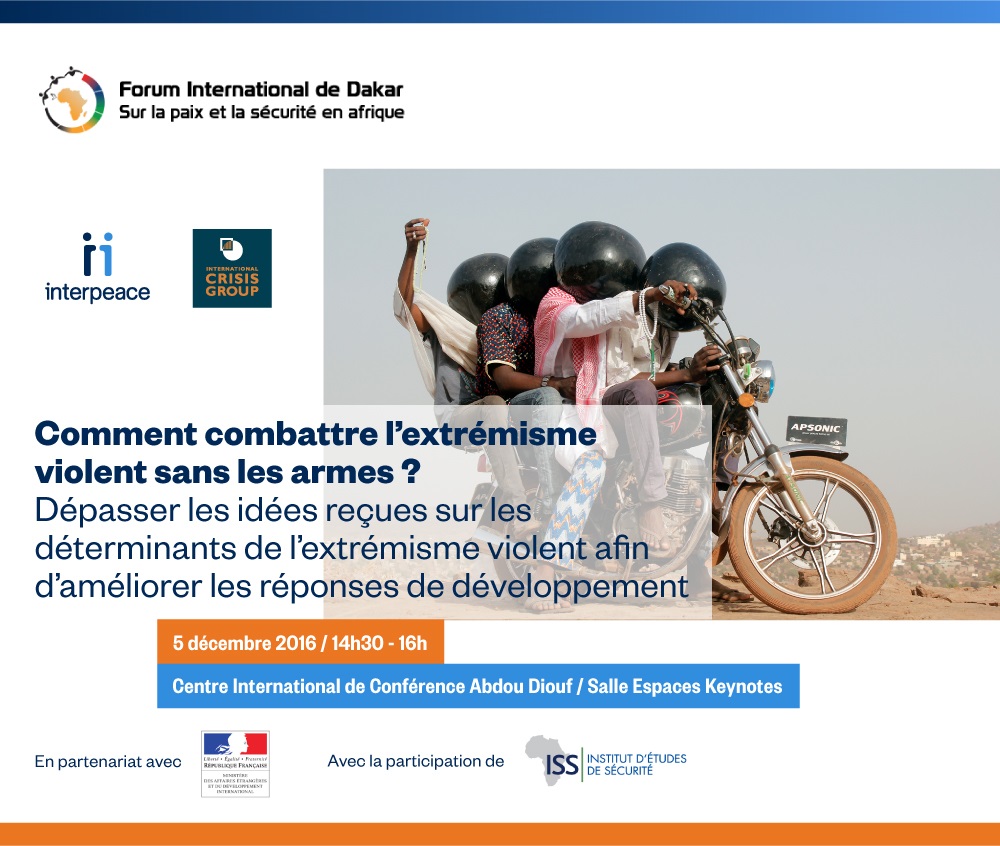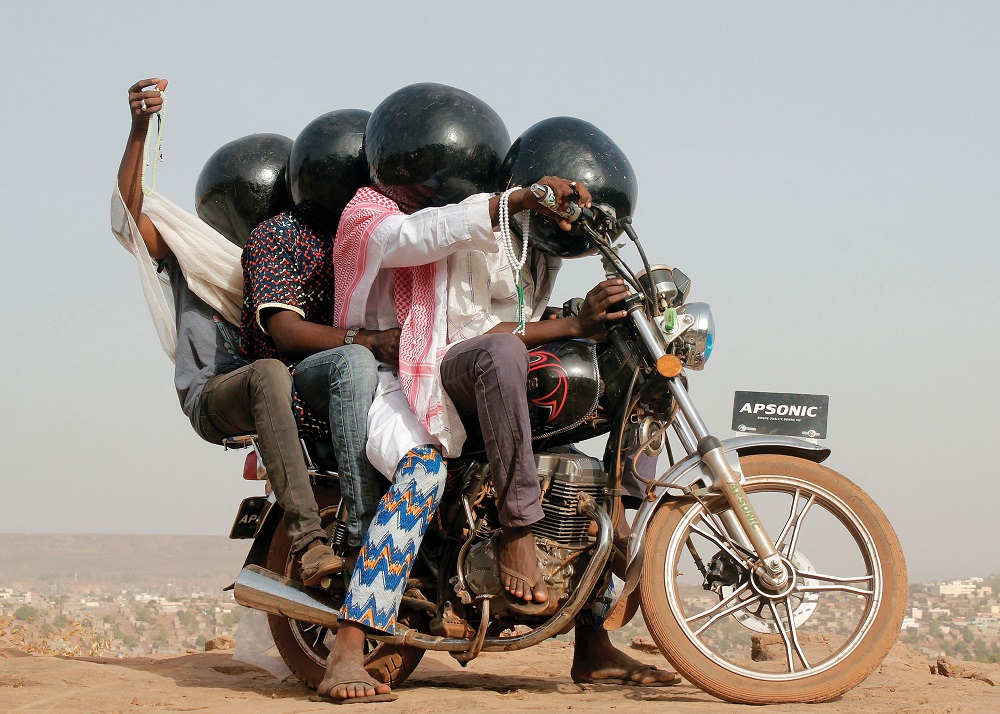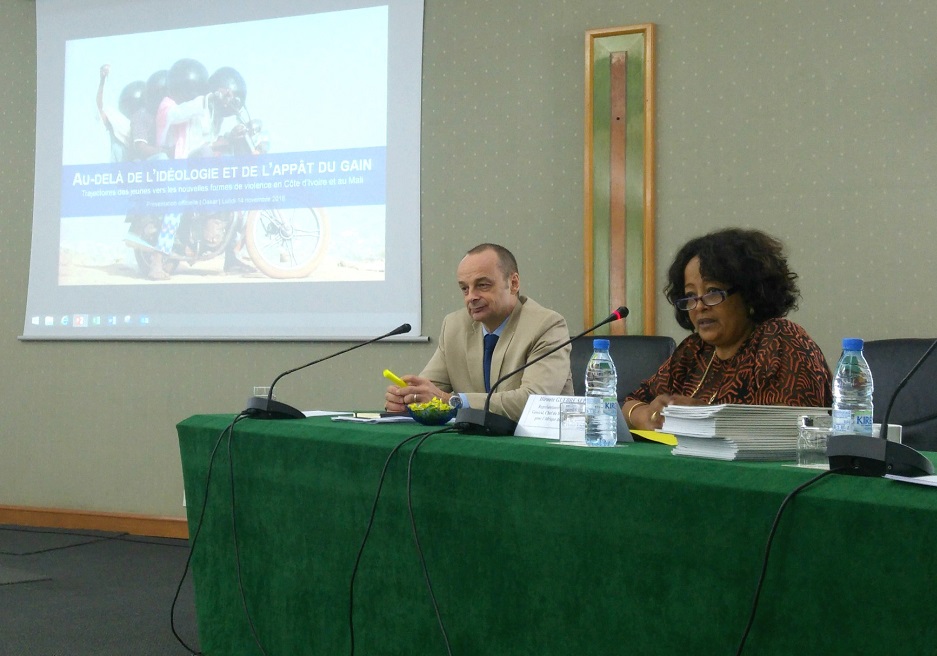« Je marche avec les garçons » Trajectoires des jeunes vers la violence, miroir des dynamiques de genre à l’échelle de leur société ? Une analyse locale des rôles de genre et des pressions sociales en Côte d’Ivoire et au Mali
Le rapport issu de la recherche participative conduite par Interpeace et ses partenaires Indigo Côte d’Ivoire et l’Institut Malien de Recherche Action pour la Paix (IMRAP) intitulé « Au-delà de l’idéologie et de l’appât du gain : trajectoires des jeunes vers les nouvelles formes de violence en Côte d’Ivoire et au Mali» publié en 2016, a mis en lumière la manière dont la crise éducative d’une part, et la recherche de reconnaissance sociale et de nouveaux modèles de réussite, d’autre part, expliquent les trajectoires des jeunes vers des espaces alternatifs de socialisation pouvant les mener à l’utilisation de la violence.
Au cours des discussions et des débats qui ont suivi sa dissémination, plusieurs questions ont souligné les aspects liés au genre. Si les jeunes filles ne sont généralement pas considérées comme étant parmi les pourvoyeurs actifs de violence, il est important de mettre en relief leurs expériences dans ces trajectoires menant à la violence, en vue de comprendre leur niveau d’engagement et de participation. Il est aussi important de comprendre comment ces dynamiques influencent les trajectoires des jeunes filles, ainsi que le rôle joué par l’éducation dans la construction de ces trajectoires et de leurs déterminants.
Sur cette base, un processus de recherche complémentaire a été mené conjointement en Côte d’Ivoire et au Mali afin d’approfondir la compréhension des dynamiques développées dans le cadre de la recherche précédente autour de la question du genre.
Parmi les résultats clés de cette recherche, nous avons trouvé que : A). Les attentes sociales envers les jeunes, indifféremment du genre, se transforment aujourd’hui pour se centraliser de plus en plus sur leur contribution économique. En outre, plus le milieu est précaire, et plus la pression économique est précoce. B). Bien que les femmes commencent à assumer un rôle économique important, cela n’assure pas leur « émancipation. ». Toutefois, cela entraine une crise de la masculinité chez les hommes qui doivent maintenant se redéfinir et s’affirmer d’une certaine manière. C). Une autorité et un contrôle social trop stricts peuvent pousser certains jeunes, garçons comme filles, vers la marginalisation et mener certains d’entre eux à commettre ou à porter des actes de violence. Et D). Il est nécessaire de développer de nouveaux modèles de réussite pour les jeunes filles et les jeunes garçons qui ont du mal à s’identifier aux modèles mis en place par les sphères traditionnelles et communautaires, par leurs ainés ou par l’école.
Ces conclusions constituent l’amorce d’une action collective autour de la question centrale des modèles de réussite définis pour les jeunes, filles comme garçons, dans la région.
_____________________________
Resulting from a participatory research conducted by Interpeace and its partners Indigo Côte d'Ivoire and the Institut Malien de Recherche Action pour la Paix (IMRAP), the report entitled Beyond ideology and greed: trajectories of young people towards new forms of violence in Côte d'Ivoire and Mali published in 2016, highlighted how the educational crisis on the one hand, and the search for social recognition and new success models on the other, explain the trajectories of young people towards alternative spaces of socialization, which can lead to (the use of) violence. During the discussions and debates following its dissemination, several questions pointed to the issues of gender. While girls are generally not among the active providers of violence, it is important to highlight their experiences in the path to violence in order to understand their level of involvement and participation. It is also important to understand how these dynamics influence the trajectories of girls, and how education influences them.
On this basis, a complementary research process was conducted jointly in Côte d'Ivoire and Mali to deepen the understanding of the gendered dynamics based on the findings of the previous research.
Among the most important research findings, we found that: A). Society’s expectations of young people, whatever their gender, is focusing more and more on their economic contribution. In fact, the less privileged they are, the more pressure they are under to contribute. B). Though women are beginning to take on a more important economic role, this does not ensure their “emancipation”. However, it brings on a crisis of masculinity for men, who must now redefine and assert themselves in some way. C). Overly strict forms of authority and social control can push certain young people, both boys and girls, towards marginalization, and therefore lead some to carry out violent acts. And D). It is necessary to develop new success models for young boys and girls who have trouble identifying with social models set by traditional and community spheres, by their elders or by school.
These conclusions constitute the launching pad for collective action around the central question of success models set out for young people, both boys and girls, in the region.


























